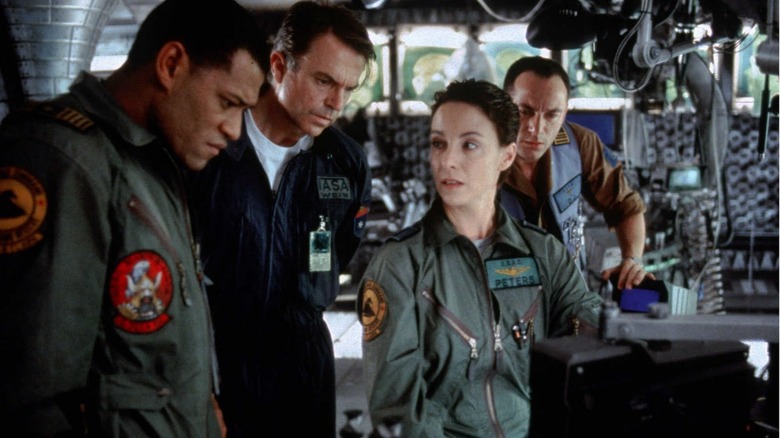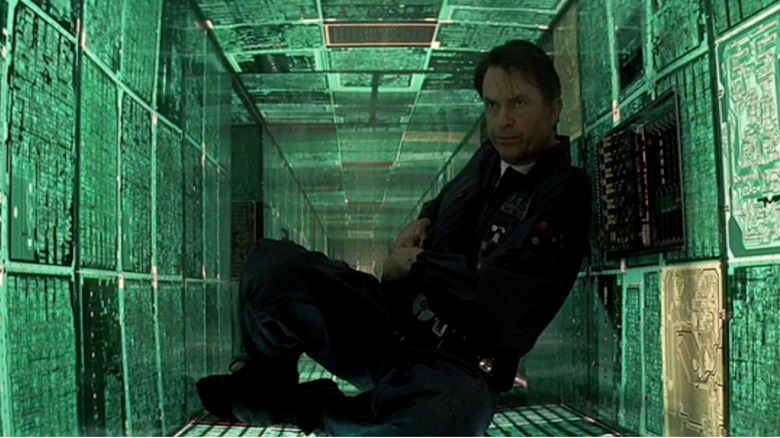Studio Execs Fretted Over Star Trek Slander In The 1997 Film Event Horizon
Paul W.S. Anderson's high-octane sci-fi/horror film "Event Horizon" takes place in the year 2047 when humanity is on the cusp of inventing faster-than-light travel. The title alludes to an experimental starship that went missing on its maiden voyage seven years before the events of the film. When the Event Horizon mysterious reappears out near Neptune, a team of astronauts is dispatched to investigate.
En route to Neptune, the Event Horizon's designer, Dr. Weir (Sam Neill), explains to the other astronauts that his ship doesn't actually travel faster than light — that would violate the Law of Relativity — but it can "bunch up" space and pass through a dimensional portal. Weir illustrates the way his engines work by using a pencil to poke a hole through both ends of a nearby Playboy centerfold, folded in half. The Event Horizon folds space, passes through the "head" end of the centerfold, unfolds space, and appears at the "feet" instantaneously.
The twist in "Event Horizon" is that the ship passed through an alternate dimension while it was traveling, and that alternate dimension just happened to be Hell. Now the Event Horizon is lousy with evil. The astronauts are subsequently tortured by demons and insanity. Human bodies are mutilated beyond recognition, and people gleefully pull out their own eyeballs. It's a wildly violent film.
In 2022, to celebrate the 25th anniversary of "Event Horizon," Anderson talked with Variety about its making, its violence, and how it — to both his chagrin and wicked delight — kind of violated the optimistic spirit of "Star Trek." "Event Horizon" was distributed by Paramount in the United States, and Anderson recalls a Paramount exec pointing out, with shock, that they also put out "Star Trek."
Executives worried Event Horizon was 'besmirching' Star Trek
Note that no one at Paramount complained that "Event Horizon" was knocking off anything in "Star Trek" specifically. The warp engines on "Star Trek" are different enough from the portal-based travel in "Event Horizon" that no one could be accused of repeating known sci-fi ideas. Additionally, the crew of astronauts in "Horizon" are friendly, crass grease monkeys, a far cry from the ultra-clean Starfleet officers of "Trek."
But because "Event Horizon" was so gory and violent, Anderson encountered a small amount of consternation. Paramount's most popular space opera was known for its optimism, cleanliness, and adherence to peace and propriety. Setting a "Hellraiser"-adjacent blood orgy in a starship seemed to rattle a few sensitive souls. Anderson recalled:
"Someone actually said to me, 'We're the studio that makes 'Star Trek!"' [...] They weren't only horrified by my movie; they felt I was besmirching 'Star Trek' somehow, because I was also in space and doing all this terrible stuff."
"Star Trek" is also typically a very inspiring show, providing audiences with aspirational characters in a utopian world. "Event Horizon" ends with the idea that Hell is closer than you think. The director knew that his film was going to leave people feeling gross and nihilistic, in perhaps another conceptual blow to "Star Trek"-defensive execs:
"I don't think we were ever going to test great because the end of the movie is a bit of a downer. [...] When you disturb an audience they're not going to go, 'Oh, that was an excellent cinema-going experience.' But we delivered a movie that really stayed with people. I think that overtime it's been appreciated for that."
Indeed, "Event Horizon" has garnered a massive cult audience over the years, and has many defenders.
Including, it so happens, many Trekkies.

